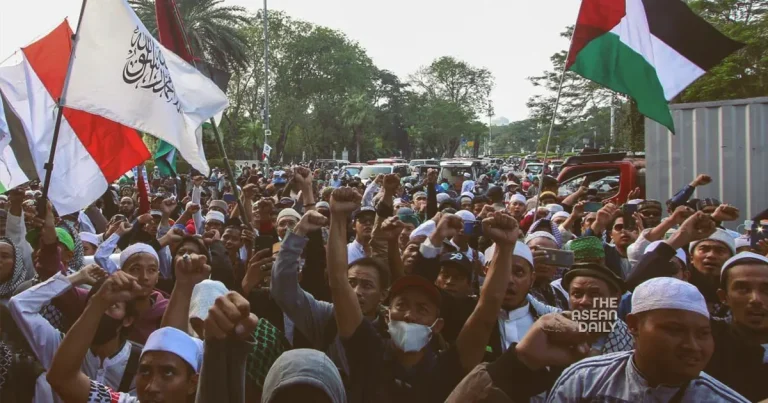13-4-2024 (JAKARTA) Amidst swirling reports of a potential diplomatic thaw with Israel, the Indonesian government has firmly denied allegations that it will establish formal ties with the Jewish state in exchange for membership to the prestigious Organization for Economic Co-operation and Development (OECD). This stern rebuttal comes in the wake of claims made by Israeli media outlets, suggesting that Jakarta had agreed to normalise relations with Jerusalem as part of a purported deal to secure OECD accession.
The controversy began when the Israeli newspaper Yedioth Ahronoth reported on Thursday that Indonesia, the world’s most populous Muslim-majority nation, had consented to normalise its ties with Israel. The media outlet alleged that this agreement was reached after three months of secret talks between Israel, Indonesia, and the 38-nation OECD, claiming that Jakarta needed Israel’s approval to join the esteemed organisation.
According to Yedioth Ahronoth, the reported deal hinged on Indonesia, a staunch supporter of Palestinian statehood, undertaking to normalise its relations with Jerusalem. The newspaper cited a recent letter from OECD Secretary-General Mathias Cormann to Israeli Foreign Minister Israel Katz, stating that any future decision to accept Indonesia as a member would require unanimous agreement among all members, including Israel.
Katz, in a purported response to Cormann, was quoted as expressing his expectation of a “positive change in Indonesia’s policy towards Israel, and in particular a renunciation of the discriminatory policy towards Israel, towards the establishment of full diplomatic relations between the parties.”
The Times of Israel corroborated the report, citing an unnamed Israeli official who spoke about Indonesia’s potential normalisation of ties with Israel. However, the OECD itself has remained silent on the matter, offering no official comment on the media reports.
Amidst the swirling speculation, Indonesia’s Foreign Ministry spokesman, Lalu Muhamad Iqbal, moved swiftly to quash the allegations, asserting that Indonesia’s stance toward Palestine remains unwavering, and its “support for Palestine’s independence” through a two-state solution is resolute. “Until today, there are no plans to open diplomatic ties with Israel, particularly amid Israel’s atrocities in Gaza,” Lalu stated emphatically on April 11th.
He further underscored Indonesia’s steadfast commitment, adding, “Indonesia will always be consistent in being at the forefront of defending the rights of the Palestinians.” This stance aligns with Indonesia’s long-standing condemnation of Israel’s actions in Gaza and its support for South Africa’s litigation against Jerusalem at the International Court of Justice in The Hague.
Experts and analysts have echoed the Indonesian government’s position, deeming the prospect of normalizing ties with Israel under the current circumstances as highly improbable. Julia Lau, a Senior Fellow and co-coordinator of the Indonesia Studies Programme at the ISEAS-Yusof Ishak Institute, stated that the ongoing situation in Gaza would not permit the Indonesian government to “contemplate such a dramatic move” as expediting formal diplomatic relations with Israel, describing it as “political suicide” that could cause severe tensions.
“It would also not be in keeping with Indonesian policy so far calling for a ceasefire and humanitarian assistance to Palestine in addition to a two-state solution,” Lau told The Straits Times, underscoring Indonesia’s unwavering commitment to the Palestinian cause.
Dinna Prapto Raharja, an associate professor of international relations at Bina Nusantara University, shared a similar view, asserting that given the continuing violence in the Gaza Strip, the Indonesian government would not normalise ties with Israel. She suggested that the media reports might be part of a broader effort by certain Israeli hardline groups to discredit Indonesia and undermine its persistent campaign to “humanise Palestinians and set Palestine free.”
Lau further posited that the OECD issue might be exploited by certain groups in Israel to “pressure Jakarta into a corner,” a tactic she believes would ultimately backfire on Israel more than anything, as global opinion increasingly aligns against Israeli policies.
“The Israelis would know that world opinion is increasingly arrayed against them, even among Western governments that have long had positive ties with Israel,” Lau added.
This is not the first time reports of potential diplomatic ties between Indonesia and Israel have surfaced, only to be swiftly refuted by Indonesian authorities. In 2016, a report by The Times of Israel quoted Prime Minister Benjamin Netanyahu as saying, “It’s time for there to be official relations between Indonesia and Israel. We have many opportunities for bilateral cooperation, especially in the fields of water technology and high-tech.” However, the Indonesian government promptly rebuffed Netanyahu’s call for closer relations.
Similarly, in 2022, former Indonesian Vice President Jusuf Kalla suggested that the government open diplomatic ties with Israel to enable Indonesia to act as a mediator between Israel and Palestine, a proposal that garnered little traction.
Amidst the ongoing controversy, Indonesia remains steadfast in its pursuit of OECD membership, a process that Foreign Ministry spokesman Lalu acknowledged would require “quite a long time.” Indonesia is expected to adopt a roadmap for its OECD accession in May, with the aim of becoming the first Southeast Asian member of the esteemed organisation.
“The duration of time needed by each country to fully achieve full membership in the OECD varies. All depends on its readiness,” Lalu stated, underscoring Indonesia’s commitment to meeting the high standards required for accession.
As Southeast Asia’s largest economy, Indonesia hopes to complete the process within two or three years, according to Coordinating Minister for Economic Affairs Airlangga Hartarto. Participation in the OECD, which necessitates institutional reforms to comply with the group’s rigorous standards, is seen as a crucial step in Indonesia’s ambitious goal of attaining developed nation status by 2045, marking its centennial anniversary of independence.




